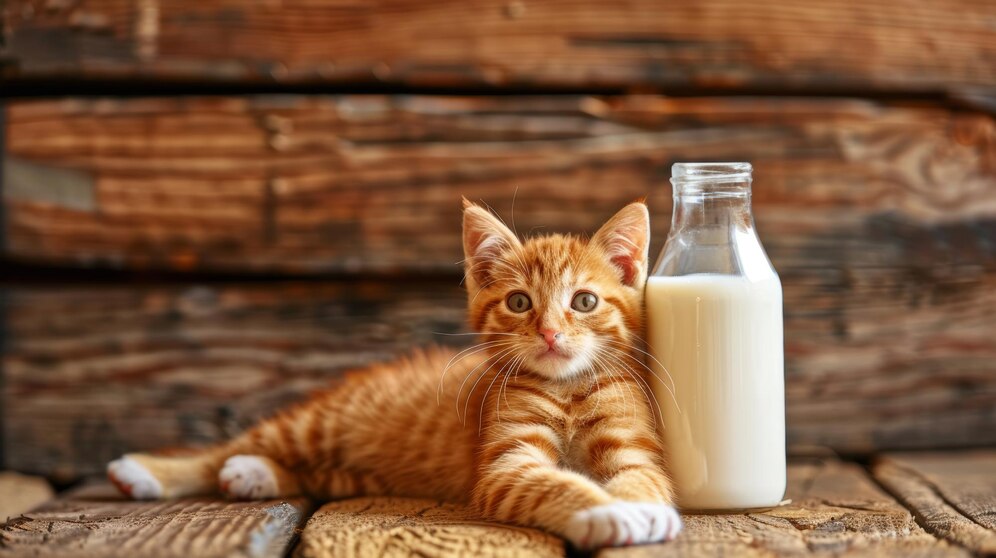You’ve probably seen those classic images of cats happily lapping up a bowl of milk. But is this really good for them? Can cats drink milk safely, or is it doing more harm than good?
Many cat owners may be surprised to learn that, despite popular belief, milk isn’t the best treat for our feline friends. While cats might enjoy the taste, milk can cause some unexpected health issues that are often overlooked.
Understanding why milk can be harmful is crucial for keeping your cat healthy and happy. Knowing what’s safe for them to drink will help prevent digestive problems and other issues down the line. Before pouring your cat a bowl of milk, read on to discover the truth behind cats and milk, and explore some safer alternatives to keep your pet hydrated and satisfied!
Can Cats Drink Milk?
The simple answer is no, milk is not good for cats. While many people think of milk as a tasty treat for their feline friends, it can actually lead to digestive problems for most cats. Many adult cats are lactose intolerant, meaning they lack the enzyme lactase needed to break down lactose, the sugar found in milk. When cats consume milk, it can result in upset stomach, cramps, and diarrhea. Read why your cat follow you to the bathroom
Can Kittens Have Milk?
Kittens can often be associated with the idea of drinking milk, but it’s essential to understand their nutritional needs as they grow. While young kittens may enjoy the taste of milk, they typically cannot digest it effectively after weaning. Most kittens become lactose intolerant, meaning they lack the enzyme lactase needed to break down lactose, the sugar found in milk. This can lead to digestive issues such as upset stomach, diarrhea, and discomfort. Read Also can cats eat peas
For kittens, the best source of nutrition is their mother’s milk or, if that’s not available, a high-quality kitten formula. These formulas are specifically designed to meet their nutritional requirements, providing the right balance of proteins, fats, and vitamins for healthy growth and development. Read more Here
Once kittens reach around eight weeks of age and start transitioning to solid food, it’s best to offer fresh water as their primary drink. If you still want to give them a milk-like treat, opt for specially formulated lactose-free cat milk, which is safe for them to consume without the digestive issues associated with regular milk.
Can Cats Drink Milk Alternatives?
Cats can drink certain milk alternatives, but it’s essential to choose wisely. Many traditional milk alternatives, such as almond or soy milk, are not suitable for cats. These beverages often contain additives, sugars, or ingredients that can be harmful to their health. Additionally, cats may not digest these plant-based alternatives well, leading to gastrointestinal upset. Learn stages of kidney disease in cats
However, there are specially formulated milk alternatives designed specifically for cats. These products are usually lactose-free and contain ingredients that are safe for feline digestion. They can provide a tasty treat without the digestive issues associated with regular milk.
Why Do Adult Cats Crave Milk?
Although adult cats are generally lactose intolerant, they may still crave milk due to positive associations formed in kittenhood. Milk’s creamy texture and rich flavor can evoke comforting memories for cats, similar to how humans enjoy nostalgic comfort foods. This craving doesn’t mean milk is nutritionally appropriate for adult cats, but it explains their attraction. is kidney disease killing your cat
What are the Symptoms of Cats Suffering from Milk Consumption?
Here are some common symptoms to watch for if a cat has consumed milk:
- Diarrhea
- Upset stomach
- Vomiting
- Gas or bloating
- Abdominal cramps
- Lethargy
- Decreased appetite
- Discomfort or signs of pain after eating
What Can Cats Drink Instead of Milk?
Humans have long associated cats with bowls of milk, but there are safer alternatives that can keep your feline friend hydrated. Cats primarily need meat in their diets and don’t require milk. Fresh water should always be the main beverage offered, so make sure your cat has access to clean, fresh water throughout the day. A water fountain can be a great option, as many cats enjoy drinking moving water, which can encourage them to stay hydrated. Read Also can cats eat carrots
If you want to treat your cat, consider specially formulated lactose-free cat milk, designed specifically for their digestive system. Some cats also enjoy bone broth or diluted chicken broth (without onions or garlic) as a tasty option. Small amounts of low-sodium vegetable juice can be offered as well, just ensure it doesn’t contain harmful ingredients. Learn about is kale safe for cats
How Can I Give My Cat Milk Safely?
Our experts recommend foods like Hill’s Science Diet Kitten Tender Morsels with Milk and Royal Canin Feline Health Nutrition that include a touch of milk, allowing your cat to savor creamy flavors without the risk of digestive upset. These options provide a delightful taste while ensuring your cat receives complete and balanced nutrition.
Read Also



